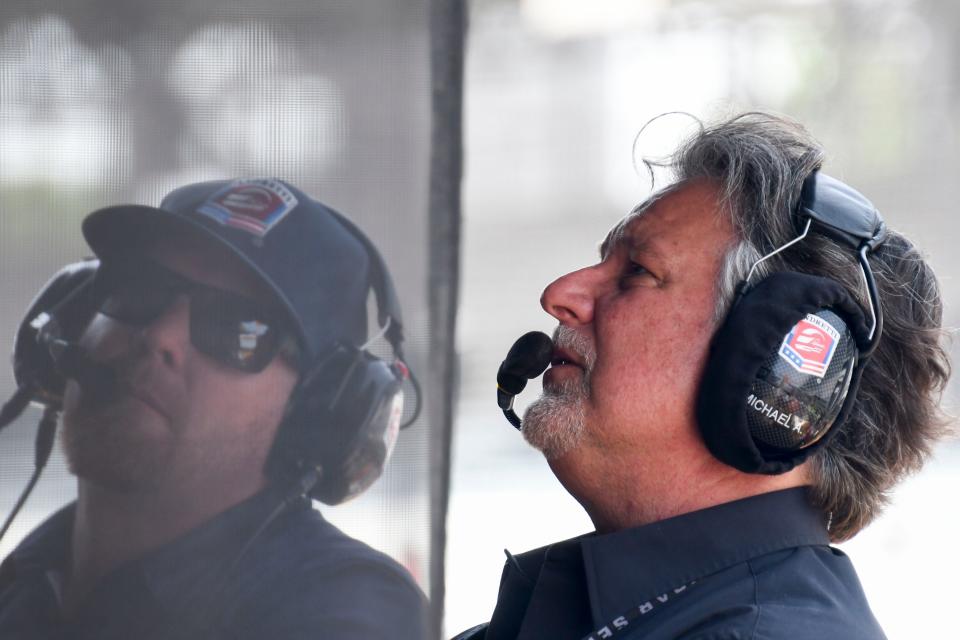Mark Miles: IndyCar proposed charter system to owners without guaranteed Indy 500 entries
Penske Entertainment Corp. CEO Mark Miles assured reporters Thursday that guaranteed entries for the Indianapolis 500 are not a shoo-in feature for the series' long-awaited charter program.
In fact, Miles said, the feature was omitted from series leadership’s latest proposal presented to team owners for such a system on Wednesday – a move which the longtime series executive has already fielded “quite a lot of phone calls about” in the 24 hours since.
“We said, ‘We want you to think about this without the assurance of charter members having automatic starting positions on the grid for the 500’,” Miles told a small group of reporters Thursday. “That’s what we aired, and of course, we immediately heard a lot of other team owners saying, ‘Woah, that’s really important!’ So it’s a key discussion point, for sure.”
More: IndyCar owners weigh guaranteed 500 entries as part of new charter program

Wednesday’s proposal follows a similar meeting near the end of 2023 where, according to one source present for the meeting, IndyCar brass proposed future members pay $1 million per entry in the system for charters, with possession through 2030.
With the knowledge that NASCAR’s similar system adopted in 2016 granted owners possession of charters that guaranteed them elevated prize money and entry into every race, free of charge at the time of granting, IndyCar team owners were said to have forcefully struck down the idea and asked Miles and others to return to the drawing board.
With the potential success of this latest proposal – as well as its specifics beyond the lack of guaranteed 500 entries – unknown, Miles says Penske Entertainment hopes to have a concept “fully developed and adopted” before this year’s Indy 500.
When such a system would be officially launched is also unclear.
IndyCar working to enrich team owners: 'We can’t eliminate opportunity for continued growth.'
“We put out a couple different concepts for charters in previous team owner meetings, and frankly, we’ve not been very close on a consensus of what it might look like,” Miles said. “(We hope) that maybe this will have more traction, and we’re going to work with a smaller group of team owners to get that developed.
“We’ve all been talking about this for a while, so we want to figure it out and really lock up with the teams on figuring out what’s satisfactory and what creates value for them and for the series.”

Miles did say that, should such a system move quickly from concept to adoption, the list of the 22 members enrolled in the current Leaders Circle program for 2024, along with the general makeup of the grid entering this season, would likely play a significant role in determining that membership roster – making it all the more imperative to lock something in before getting too deep into this 2024 campaign.
'Ruining the prestige': IndyCar fans denounce idea of guarantee spots on Indy 500 grid
Having seen the swift backlash in response to an IndyStar story that brought to light the serious possibility of guaranteed 500 entries and the history of Indy’s ‘fastest 33’ qualifying traditions, Miles said that fan sentiment played a notable role in the latest proposal.
“It wasn’t a surprise, right? I think we could all anticipate that,” he said. “We have a sense of how fans will react to different things, so what’s happened so far in that regard isn’t surprising, but they’re conversations to be had, and often there’s more than one way to split a pickle, so we’ll see where we end up.”
Among those likely to be elated with Penske Entertainment’s latest charter system proposal? A member of its own leadership committee: IMS president Doug Boles.
“It should be the fastest 33 cars that qualify for the Indy 500, and I think everyone internally here knows that position, and I voice that position,” Boles said to IndyStar. “I know it was something that was talked about as a way to give value to the team owners, as they’re investing in the series, and I think it’s important that leadership looks at the big picture and asks ‘What really does add value?’
“You can’t fault an organization for looking at how they make sure of the health of the organizations - and it’s about both the teams and the fans, and trying to balance those sometimes becomes a challenge. I think Roger (Penske) is in a weird spot, where he’s trying to take care of an industry, and he understands and gets it. No matter where it lands, Roger hears everybody, and at the moment, we’re in the right spot.”
This article originally appeared on Indianapolis Star: Mark Miles: IndyCar charter system may not include guaranteed Indy 500 entries
